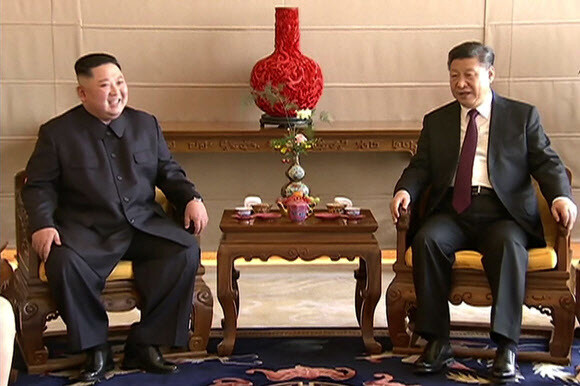hankyoreh
Links to other country sites 다른 나라 사이트 링크
Kim Jong-un and Xi Jinping to adopt 2-track strategy for Korean Peninsula peace regime

During their fourth summit, North Korean leader Kim Jong-un and Chinese President Xi Jinping appear to have adopted a two-track strategy of separating the negotiations for creating a peace regime on the Korean Peninsula from the North Korea-US negotiations about denuclearization and normalizing relations, some experts say.
The view that Kim and Xi devoted considerable attention in their deliberations on Jan. 8 not only to plans for denuclearization talks but also to the question of building a peace regime on the Korean Peninsula is regarded as quite credible by the diplomatic community. Experts believe that this plan is implied by the two leaders’ discussion of “jointly guiding research on the process of negotiating denuclearization and on managing affairs on the Korean Peninsula” (Korean Central News Agency, Jan. 10) and in Kim’s remarks about his “hope that [related countries] will work with us so that the Korean Peninsula issue can be fully resolved” (Xinhua News, Jan. 10).
The most overt remark was Kim’s declaration in his New Year’s address that he would also actively “promote multiparty negotiations for replacing the current ceasefire on the Korean Peninsula with a peace mechanism” with “the signatories of the armistice agreement.” China was one of the countries that signed the armistice agreement on July 27, 1953.
During the summit, Xi described China’s role in terms that were more concrete and proactive than in his first three summits with Kim: “[China] wants to play an active and constructive role in realizing the peace and stability of the peninsula, its denuclearization and the long-term stability of the region” (Xinhua News).
Another related development is the fact that China has recently resumed emphasizing the role of the Six-Party Talks. “The Six-Party Talks provided a valid framework for promoting exchange between the parties and for improving mutual relationships. We hope they can continue to be put to good use,” said Kong Xuanyou, China’s vice minister of foreign affairs and China’s special representative for Korean Peninsula affairs, during a forum on Dec. 1, 2018.
The topic was brought up once again by Chinese Foreign Ministry Spokesperson Lu Kang on Jan. 8, the day of the North Korea-China summit: “[The Six-Party Talks] drove the process of resolving the Korean Peninsula issue, and it’s still the process that has gotten the most active results. China will continue to work in concert with related countries to promote this process.”
“In addition to agreeing on the definition of denuclearization, [Chairman Kim and President Xi] may also have reached a certain understanding about a two-track process in which denuclearization is pursued through North Korea-US negotiations and the peace regime is pursued through six-party or four-party negotiations,” said Koo Kab-woo, professor at the University of North Korean Studies.
Gary Samore, former White House Coordinator for Arms Control and Weapons of Mass Destruction, was quoted by Voice of America on Jan. 11 as predicting that North Korea would soon propose multilateral negotiations for creating a peace regime on the Korean Peninsula and that, once North Korea-US denuclearization talks resume, the two sets of negotiations would proceed in tandem.
But since the details of China’s role and the plan for the denuclearization talks that Kim and Xi shared have yet to be made public, only time will tell what impact the results of Kim and Xi’s fourth summit will have on the Korean Peninsula denuclearization process.
By Kim Ji-eun, staff reporter
Please direct comments or questions to [english@hani.co.kr]
Editorial・opinion
![[Guest essay] Maybe Korea’s rapid population decline is an opportunity, not a crisis [Guest essay] Maybe Korea’s rapid population decline is an opportunity, not a crisis](https://flexible.img.hani.co.kr/flexible/normal/500/300/imgdb/original/2024/0430/9417144634983596.jpg) [Guest essay] Maybe Korea’s rapid population decline is an opportunity, not a crisis
[Guest essay] Maybe Korea’s rapid population decline is an opportunity, not a crisis![[Column] Can Yoon steer diplomacy with Russia, China back on track? [Column] Can Yoon steer diplomacy with Russia, China back on track?](https://flexible.img.hani.co.kr/flexible/normal/500/300/imgdb/original/2024/0430/1617144616798244.jpg) [Column] Can Yoon steer diplomacy with Russia, China back on track?
[Column] Can Yoon steer diplomacy with Russia, China back on track?- [Column] Season 2 of special prosecutor probe may be coming to Korea soon
- [Column] Park Geun-hye déjà vu in Yoon Suk-yeol
- [Editorial] New weight of N. Korea’s nuclear threats makes dialogue all the more urgent
- [Guest essay] The real reason Korea’s new right wants to dub Rhee a founding father
- [Column] ‘Choson’: Is it time we start referring to N. Korea in its own terms?
- [Editorial] Japan’s rewriting of history with Korea has gone too far
- [Column] The president’s questionable capacity for dialogue
- [Column] Are chaebol firms just pizza pies for families to divvy up as they please?
Most viewed articles
- 1Under conservative chief, Korea’s TRC brands teenage wartime massacre victims as traitors
- 2Months and months of overdue wages are pushing migrant workers in Korea into debt
- 3[Guest essay] Maybe Korea’s rapid population decline is an opportunity, not a crisis
- 4[Column] Can Yoon steer diplomacy with Russia, China back on track?
- 5First meeting between Yoon, Lee in 2 years ends without compromise or agreement
- 6After election rout, Yoon’s left with 3 choices for dealing with the opposition
- 7[Column] Behind factional animus of Korean politics, victim mentality festers
- 8‘We must say no’: Seoul defense chief on Korean, USFK involvement in hypothetical Taiwan crisis
- 9[Editorial] Japan’s removal of forced labor memorial tramples on remembrance, reflection and friends
- 10[Guest essay] A society in which old age becomes a burden